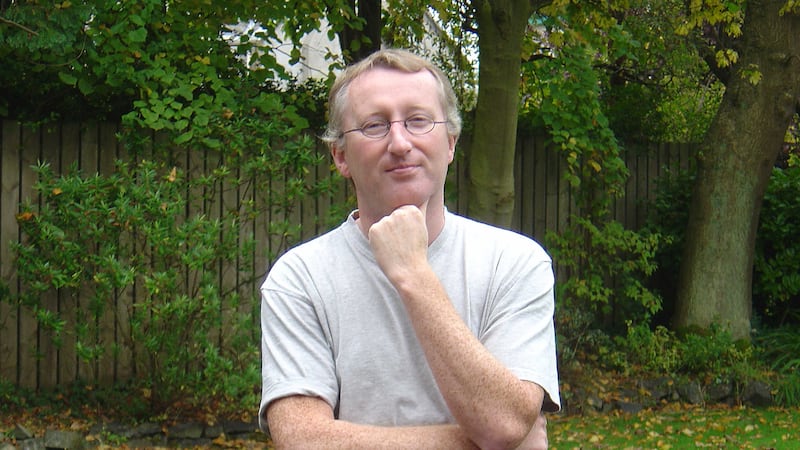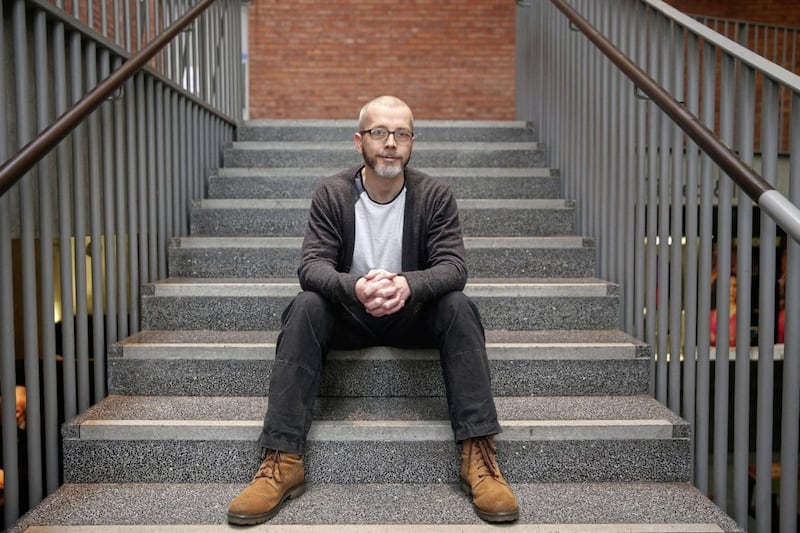WHEN people get to a certain level of fame they often drop their last name – Madonna, Cher, Kylie, Ronaldo. The artist formerly known as Colin Bateman went against the grain, as always, and dropped his first name a few years back; he now generally goes by 'Bateman'.
And well he may, for the Bangor man has published 34 novels, written a host of children's books, made three movies, several TV series, written songs for an opera about King Billy and is currently overseeing the screenplay for a movie – The Journey – about the unlikely friendship between Ian Paisley and Martin McGuinness.
He's a man who knows Northern Ireland inside out. He knows our humour and can shine a light like no other into our dark places. Rumour has it that when David Trimble was negotiating with the British government during the peace process he brought 'a Bateman' with him to 10 Downing Street telling the recipient that the book said more about Northern Ireland than could ever be found in a textbook.
Next month Bateman's second play, Bag For Life, takes to the stage at Derry's Playhouse for its world premiere.
Starring Julie Addy, best known for her role as Christina Callan in The Fall, the play questions whether forgiveness can overcome the want for revenge in 21st century Northern Ireland.
Director Kieran Griffiths calls it "a harrowing piece – strange, potent and poetic".
The play asks what we are to make of the men and women of violence whose time has been and gone, and who have settled into both civil and civilian life. It asks what if we see them on Facebook or Twitter? How can we cope? How can we forgive?
“It's about a young mother who encounters a man from her past,” says Bateman. “In the most unexpected place – her local Tesco – when she presumed he was still serving time for the murder of her brother. The play is really about her, at times, extreme reaction to that meeting.”
Bateman, never one to shy away from the dark side of life, says the play is essentially about forgiveness.
“I’m not really one for addressing difficult issues,” he says. “It would be very hard for me to sit down and write something ‘about’ difficult issues – really, I write a story and the issues tend to emerge from it. In this case it’s about forgiveness, which is a great concept but difficult to put into practise if you are reminded of past traumas every day. I should also add that Bag for Life is quite funny as well!”
He says he did not consult with specific Troubles victims when forming the play because “everyone who grew up in Northern Ireland is very aware of the issues" and he's “never been a ‘research’ kind of a writer”.
Bangor has seen its fair share of Troubles-related trauma. During the conflict there were eight murders in the town, including that of the first RUC woman to be murdered on duty, and was the target of several massive IRA bombs.
Does Bateman think former combatants can settle back into normal 'civilian life' or, to ask the question the play poses, is their capacity for murder still there?
“I don’t think there’s any one answer to that,” he says. “If you’ve killed someone, even for a passionately held cause, you’ve still killed someone and have a capacity to do it. It may never happen again, but there’s always that worry on both sides that it could. That’s hard for people to get past.”
He says rather than the play driving us towards a destination of forgiveness, it's more to a place where it's “good to question”.
Bag for Life's opening comes just two months after the launch of Bateman's last novel, Papercuts. The book revolves around the newsroom of the Bangor Express – a fictional newspaper in Bateman's hometown – and its dysfunctional, highly unpopular and poverty-stricken family of journalists.
Bateman says although the book is about a Bangor newsroom, not a million miles away from the newsroom of the Bangor Spectator newspaper he worked in as a journalist two decades ago, it is purely a work of fiction.
“I haven’t been a journalist for 20 years. That said, my days on a weekly newspaper in Bangor were hugely formative and influential and I wouldn’t have become a writer without those experiences," he says.
“I don't miss being a journalist. There were some good times but I prefer not to let the facts get in the way of a good story.”
Journalists are perpetually looking for the next big story – as a former hack does Bateman find himself doing the same thing with books?
“Not just books, but all the different forms of writing that I do – and I think that’s natural enough. I don’t think I’ll ever get to the point where I’ll sit back and say that’s my writing done, or that I’m out of ideas.
“Most writing is about 95 per cent getting your bum on a seat and doing the work. Certainly when you’re a journalist and you finish a story nobody pats you on the back and tells you to take the rest of the week off – you just move on to the next ones.
"And I think that’s what I bring to my writing – so the discipline of having been a journalist helps, plus self-imposed deadlines and word counts. I’m also pretty good at editing my own work as I go, which definitely comes from my sub-editing days."
How does he keep things fresh?
“Yes, there have been a lot of books,” he says, “but luckily I regularly get offers to try different things; sometimes it’s to write something for television, or a musical or just this week I was talking to somebody about doing something for a computer game – I may be rubbish at some of these things but I’ll always take a crack at something.
"I think it’s this variety that helps keep me fresh and not totally focussed on how many books I may or may not be selling.”
With a schedule that would make a mere mortal's head spin, Bateman is also overseeing the filming of the aforementioned movie The Journey, which stars Timothy Spall and Colm Meaney.
His finger firmly on the north's pulse as usual, Bateman's script was inspired by a journey made by Paisley and McGuinness back from the St Andrews talks.
“It was actually the director Nick Hamm who came to me with an idea to do something about Paisley and McGuinness,” he says.
“While knowing that we wouldn’t have the time (or the money!) to do both of their life stories, as in a traditional biopic. But then we discovered that almost by accident they’d ended up travelling home together from the St Andrews talks, and that this was the first time they’d actually spoken to each other – and that’s a great set up for a drama. It’s a work of fiction, but very much drawn from real events.”
In The Journey, in Bag For Life, in everything he does, 'Bateman' casts his wry, humorous eye over our dark and murky past in a way only he can.
:: The Playhouse production of Bag for Life by Colin Bateman will run from Tuesday to Saturday April 5 to 9 at 8pm. Tickets £10 at 028 7126 8027 or derryplayhouse.co.uk.








